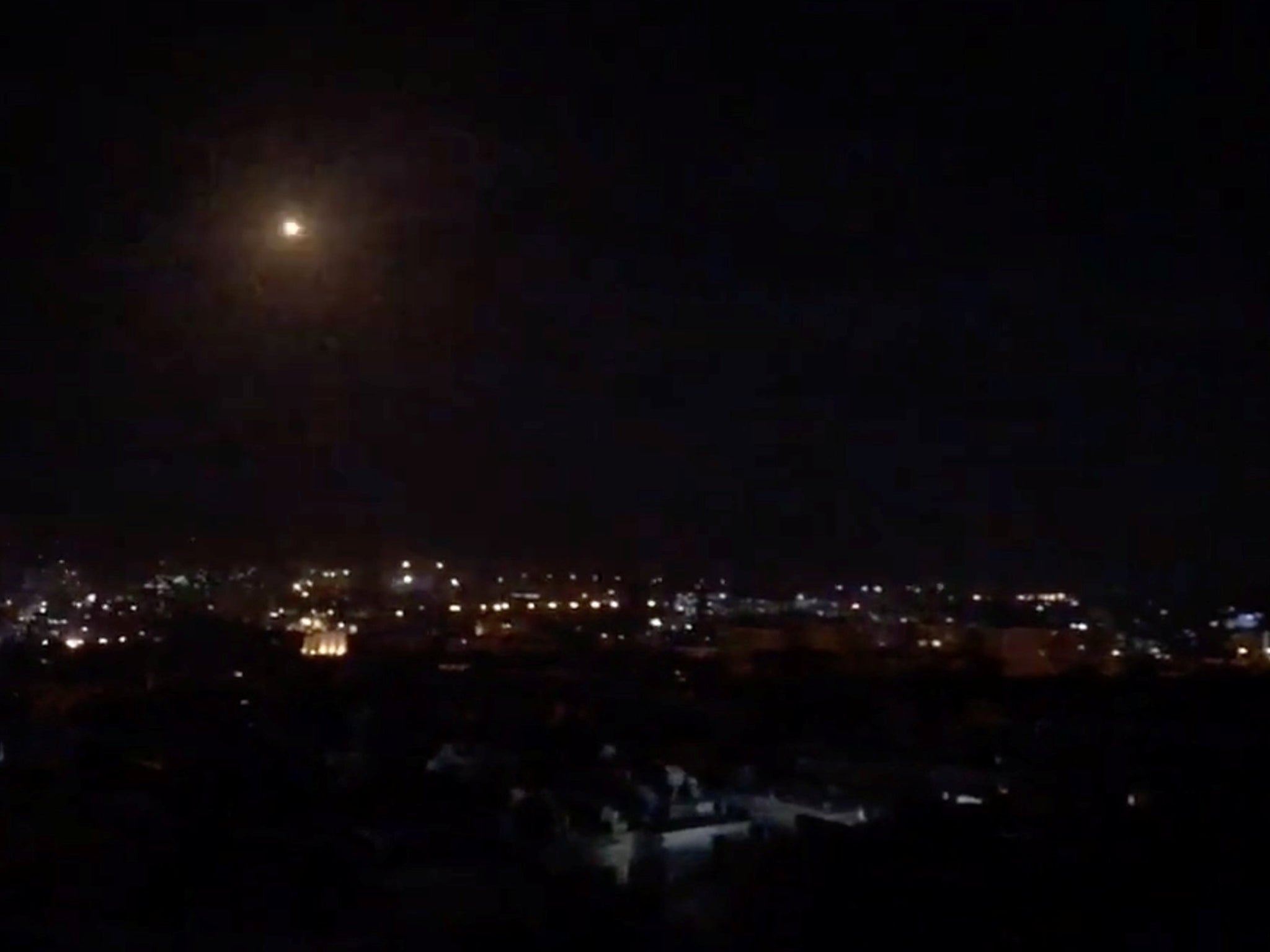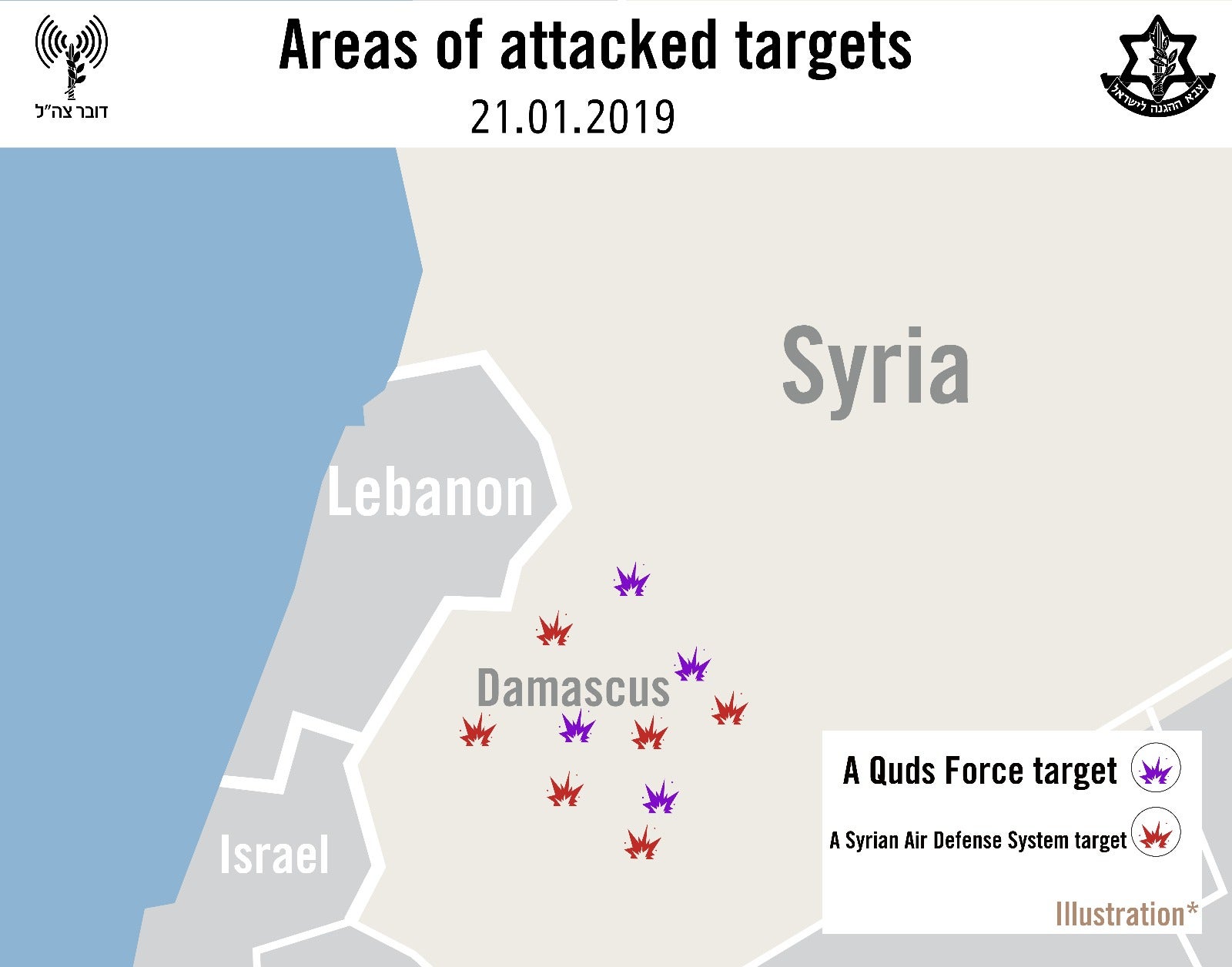Iran threatens to ‘eliminate Israel from the Earth’ as tensions escalate over Syria airstrikes
Israeli military said it launched retaliatory airstrikes on Iranian targets in Syria
Your support helps us to tell the story
From reproductive rights to climate change to Big Tech, The Independent is on the ground when the story is developing. Whether it's investigating the financials of Elon Musk's pro-Trump PAC or producing our latest documentary, 'The A Word', which shines a light on the American women fighting for reproductive rights, we know how important it is to parse out the facts from the messaging.
At such a critical moment in US history, we need reporters on the ground. Your donation allows us to keep sending journalists to speak to both sides of the story.
The Independent is trusted by Americans across the entire political spectrum. And unlike many other quality news outlets, we choose not to lock Americans out of our reporting and analysis with paywalls. We believe quality journalism should be available to everyone, paid for by those who can afford it.
Your support makes all the difference.The head of Iran’s air force has said it is ready to fight Israel “and eliminate it from the Earth” after the Israeli military said it launched retaliatory airstrikes on Iranian targets in Syria, the first time in a year it has openly claimed a specific action in the war-torn country.
Brigadier General Aziz Nasirzadeh spoke out as a monitoring group said 11 people had been killed in the Israeli sorties, which hit munition storage facilities within Damascus International Airport, an Iranian intelligence site and a military training camp.
The Russian military said four Syrian troops were among those killed. There were no further details on the casualties or their nationalities.
Israel said it had launched the strikes in response to a surface-to-surface rocket Iran’s Quds Force fired from Syria at a ski resort in the Israeli-occupied Golan Heights on Sunday, which Israeli air defences intercepted.
The unusual announcement appears to mark an end to Israel’s years-long policy of silence regarding activities in neighbouring Syria.
In response, Iranian Brigadier Nasirzadeh released a fiery statement to the Young Journalist Club, a website supervised by state television, sparking fears of a further flare-up between the two archenemies.
“The young people in the air force are fully ready and impatient to confront the Zionist regime and eliminate it from the Earth,” he said.
Lieutenant General Jonathan Conricus, the Israeli military spokesman, meanwhile, said the Iranian forces had struck Hermon ski resort, in the Golan Heights, on Sunday afternoon, using a mid-range surface-to-surface missile fired from the outskirts of Damascus. Iran has not responded to the claim.
The army spokesman called the barrage a “premeditated” attack to deter Israel from conducting airstrikes against Iran and “definitive proof” of Iran’s intentions to entrench in Syria.
“That’s a civilian site and there were civilians there. We saw that as an unacceptable attack by Iranian troops, not proxies in Syria,” he said Monday morning.
“In addition to that, the area from which the Iranians fired their missile is an area we have been promised that the Iranians would not be present in.”
“We know it was not done in the spur of the moment, it was a premediated attack,” he added.
The Israeli military said the sorties hit Iran’s “main storage hub in Syria” used to transport Iranian weapons to allies in Syria including Lebanese militant group Hezbollah.
Israel recently acknowledged carrying out hundreds of strikes in Syria over the past few years but has previously refrained from commenting for fear of triggering a reaction and being drawn into the deadly fighting in Syria, which is in the grips of an eight-year civil war.
Monday’s announcement marked the first time they had reported strikes in real time and released detailed information since last May 2018, when Israel claimed to have struck almost all of Iran’s military infrastructure in Syria, following another rocket attack on its positions in the Golan.

The Israeli army said Monday it had warned the Syrians of impending strikes which were ignored and so Syria’s aerial defence batteries were also targeted, as they launched “dozens” of surface-to-air missiles at Israeli warplanes.
“The [army] holds the Syrian regime responsible for everything taking place within Syria and warns the Syrian regime against targeting Israel or permitting it to be targeted,” the statement added.
On Sunday, Syria’s state news agency SANA quoted a military source confirming Syria’s air defences went into action. The Russian army, that alongside Iran is one of the key fighting allies of President Bashar al-Assad, reported that Syrian air defences had destroyed seven Israeli projectiles, after four of Israel’s F-16 military planes “fired rockets into Syrian territory”.
Israeli prime minister Benjamin Netanyahu and other Israeli officials have been speaking more openly about the country’s strikes on Syria in recent days. Some analysts say it is part of the premier’s push to solidfy his security credentials ahead of snap elections he called scheduled for 9 April.
But Israel also risks direct confrontation with Syria and Iran, as well as with Russia.

On Sunday, Mr Netanyahu told reporters that “we have a permanent policy: to strike at the Iranian entrenchment in Syria and hurt whoever tries to hurt us”.
Former Israel Major General Yaakov Amidror, who served as Mr Netanyahu’s national security adviser until 2013, called the airstrikes and the public acknowledgement of Israeli action a signal to Iran and its allies about the risks Israel is willing to take.
“Israel is determined to continue to prevent Iranians from building an independent war machine in Syria and is ready to take the risk of exchange of fire,” he told reporters in a briefing. “And if needed we will neutralise Syrian anti-aircraft.”
“The more Iranians try to launch rockets into Israel the more severe will be the attack in response,” he said. “It is about a strong signal to Iranians. We’re ready to escalate if you don’t stop.”
He said the Russians were likely informed about the airstrikes beforehand to give them time to relocate any personnel. “It’s not coordination; it’s deconfliction,” he said.
We know it was not done in the spur of the moment, it was premediated attack
He said the targets were likely identified as controlled by Iran or its proxies based on “strong intelligence”, but did not reveal specifics, noting that previous airstrikes rarely caused civilian casualties.
Military coordination between Israel and Russia in Syria took a hit after a friendly fire incident in September that led to a Russian plane being downed by Syrian air defences during an Israeli raid.
The incident angered the Kremlin and complicated Israel’s operations in Syria, particularly as Moscow delivered an advanced air defence system there in response.
Israel has sought to maintain its coordination with Russia as well as its free hand to strike in Syria.

Join our commenting forum
Join thought-provoking conversations, follow other Independent readers and see their replies
Comments